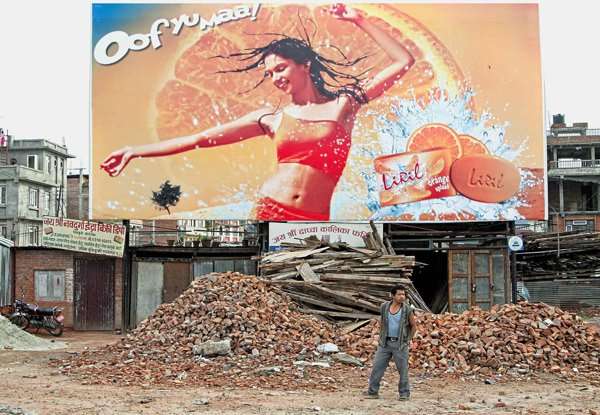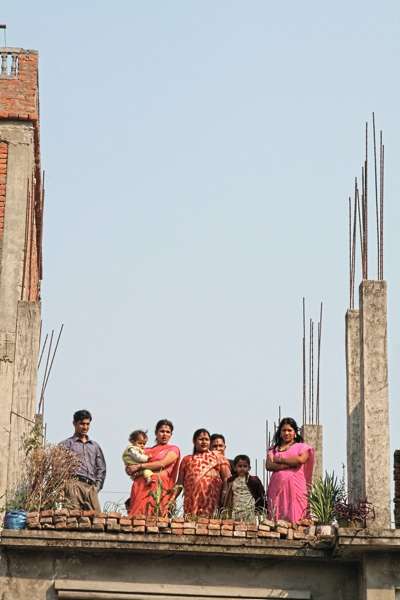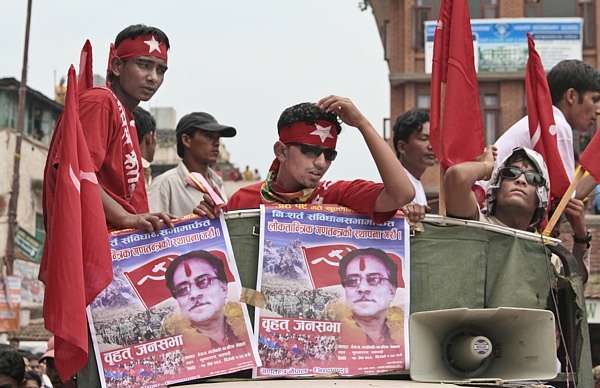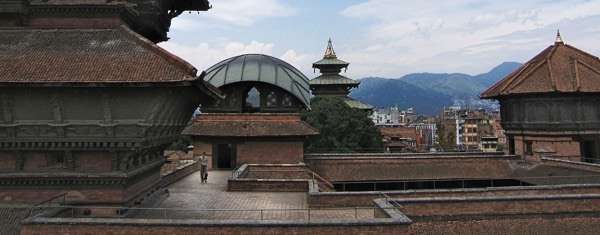Nepal's Earthquake: How Not to Rebuild a Nation
In an environment of poverty and corruption, rigorous building codes do more harm than good

The great tragedy of Saturday's earthquake in Nepal may have taken the rest of the world by surprise, but to many Nepalese, it was only a matter of time. All of the ingredients for a lethal, nationwide disaster in the land of Everest have been in place for ages: high population density, isolated mountain communities, extreme poverty, ramshackle development, political instability, state corruption, and a seismic fault line deep enough to cut through the Himalayas.
As the Nepalese know all too well, there's no easy or obvious fix for any of this. Nepal has spent centuries struggling to resolve its many problems, with results ranging from disappointing to tragic. Ke garne? as the old saying goes, meaning "What to do?" It's a quintessentially Nepalese expression born of perceived political helplessness, usually accompanied by a dim smile and fatalistic wave of the hands.
Far from the gloomy sentiments on the street, experts in the West think they know exactly what to do. The United States Agency for International Development (USAID) has an optimistic three-year plan to help Nepal develop a regional community of experts capable of establishing mandatory building standards that will minimize earthquake damage. CityLab and the United Nations agree, calling for Nepal to tighten its National Building Code to prevent future tragedies.
Although the Code has been on the books for twenty years, local builders have been free to ignore it with impunity. Today, most construction remains unregulated. To the everlasting disappointment of Shangri-La-seeking tourists, Kathmandu's slapdash sprawl gleams not with gold, but with corrugated tin rooftops and rusty, naked rebar jutting out of half-finished concrete columns. Even after a devastating earthquake in 1934 took over 10,000 lives, no comprehensive system of building regulations, planning, or enforcement was ever put into effect.

With so much at stake, why has Nepal stubbornly refused to modernize its urban landscape? Buildings designed, engineered, and constructed to withstand earthquakes survive disasters better than those slapped together with shoddy materials and construction. But the real question is always one of tradeoffs and in many parts of the planet insisting on First World construction standards would leave millions without shelter.
Nepal's Ministry of Physical Planning, Works, and Transport Management has even written up its own plans for implementing building standards, but for reasons that should be obvious, they've never gotten off the ground floor.
The first reason is cost. In a country where a quarter of the population survives on an income of less than $1.25 per day, code compliance is beyond the means of millions of Nepalese. For tens of thousands of low caste and landless squatters, known as sukumbasi, the availability of cheap, improvised housing is a matter of daily survival. Yet in supporting the establishment of quake-resistant building codes, journalists often fail to consider the prohibitive cost, and potential damage involved in criminalizing the construction of shacks and shantytowns in one of the poorest countries in the world.

The World Bank looked at the impact of building codes in the "developing" world, considering benefits and costs. For most construction, they advocate a light regulatory touch:
"Regarding building regulations in developing countries, for private homes and other small buildings, it may be that the best default approach is to educate rather than regulate, leaving regulatory construction engineers and planners to focus their efforts on relatively few high-traffic public buildings."
The World Bank made its recommendations without specific reference to Nepal, where the challenges of regulating construction are especially steep. Any retrofitting would have to accommodate buildings that range from modern shopping malls to ancient Buddhist shrines at high altitudes. It would have to create a community of professional structural engineers and standards enforcement that doesn't yet exist.
More crucially, the code would have to function within a system long reviled for bureaucratic ineptitude and endemic state corruption. Not only has Nepal's government been unable to provide a steady flow of electricity to its citizens, for the last eight years the country has stumbled along as politicians have failed to agree on a written constitution to guide the nation.
And now, as protesters rally against the government's inadequate response to the earthquake, it's not even clear whether a national emergency can unite the country.
Are you feeling that sense of Nepalese fatalism yet? Before you wave your hands and cry Ke garne?, know that past disasters offer some hope for the future. Nepal rebuilt some of its old monuments after the 1934 earthquake, and soon added a few new ones. New Road was constructed after the quake, and it quickly became home to the most desirable and prosperous businesses in the city. The absence of expensive building codes may have sped the rebuilding process considerably.
If the central government can maintain a light regulatory touch, new, vibrant communities may yet emerge from the rubble of an ancient Himalayan world.

Editor's Note: As of February 29, 2024, commenting privileges on reason.com posts are limited to Reason Plus subscribers. Past commenters are grandfathered in for a temporary period. Subscribe here to preserve your ability to comment. Your Reason Plus subscription also gives you an ad-free version of reason.com, along with full access to the digital edition and archives of Reason magazine. We request that comments be civil and on-topic. We do not moderate or assume any responsibility for comments, which are owned by the readers who post them. Comments do not represent the views of reason.com or Reason Foundation. We reserve the right to delete any comment and ban commenters for any reason at any time. Comments may only be edited within 5 minutes of posting. Report abuses.
Please to post comments


Oh, come on! Those people will be better off sleeping on the ground in public parks, next winter, than in some sort of unplanned aesthetically chaotic shantytown.
" unplanned aesthetically chaotic shantytown"
Isn't this what Howard Roark designed... with PLASTICS!?
But everyone must have a 500 sq ft flat built to withstand fire, earthquakes, rain, snow, wind, bio weapons, nukes, and multiple direct MOAB strikes. The US Taxpayers will pay for it. Will someone please think of the children?
But everyone must have a 500 sq ft flat built to withstand fire, earthquakes, rain, snow, wind, bio weapons, nukes, and multiple direct MOAB strikes. The US Taxpayers will pay for it. Will someone please think of the children?
They need two of them?
Of course. Not our money.
/UN
I'm gonna go get the papers,,,get the papers.
But... intentions!
Was it fracking or global warming that caused the earthquake?
Both. Shut down fracking! Shut down big oil!
Austerity did it!
Raston Bot|4.28.15 @ 12:28PM|#
"Was it fracking or global warming that caused the earthquake?"
It was caused by dog-eat-dog free markets!
You forgot the patriarchy, cis-het scumbag!
And let's not forget the role of the Koch Brothers...
"Was it fracking or global warming that caused the earthquake?"
It was caused by dog-eat-dog free markets!
Actual Buddhist, and progressives living in the Northeast are saying this.
For some reason, I just can't seem to summon up any sympathy for these people.
Why can't we just make earthquakes illegal and be done with it?
"Of course it is! What, are you kidding me? Santa Claus ain't legal and he's around."
If you live in an earthquake zone and can't afford to build earthquake resistant buildings, you must only build light, single-storey buildings. That way, when the buildings collapse, people are less likely to get crushed, and it's easier to put out the fires, clear the rubble, and rebuild. This is what the Japanese did for centuries.
I read somewhere that the Nepalese and basically all the people who live in the Himalayas were building flexible wooden structures for centuries, which could withstand your normal run-of-the-mill earthquake that happens every 25 years or so but that, recently, and especially after colonialism, the traditional methods of building were substituted with more Western styles using brick or cinder block and mortar, with the results that we see today.
You may be right, but a lot of those towers/temples/etc. that collapsed to basically just rubble seem pretty old to me, and don't look like Western-style construction. Of course I could be wrong, I know basically jack shit about construction styles in Nepal.
OM. So it's a problem of "forced modernization" ?
The only "solution" to this issue is prosperity. People with actual money will build houses that can withstand some earthquake action. People with no money build whatever they can to provide shelter. You can't stop that. You can't regulate it away. And regulations don't matter when they finally get to prosperity, because their own desire for self-preservation will motivate them to build safer buildings.
I found this article...unfocused. It seems to be decrying a lack of regulatory enforcement while admitting that enforcement is impossible. Then decrying the UN for thinking first world regulations will work, while lamenting Nepal's inability to apply them. Which is it? (For me, it's none of them.)
Re: Episiarch,
That is what Non-Brutalist and Squishy libertarianism looks like, Epi.
Emotional arguments, how the fuck do they work?
That Maoist government mentioned in the article will get right on that.
Epi. The Nepalese Government is looking for an IMF loan.
Never mind the high cost of building according to those codes. Who the FUCK told the United States Agency for International Development that the Nepalese want to permanently settle in one of those mountain sides? Why do you think their houses are so shoddily-built? Do you really think they do this because they're thinking of legacy? Of permanence?
The Nepalese are just like you and me. They come from the inside of the country to the cities looking to improve their lot. That improvement may mean getting the FUCK out of Nepal! So why homestead a mountainside with a permanent house that could withstand God's footsteps? That notion makes NO economic sense, and if there is something true about the Nepalese is that they're NOT fools (unlike our little red Marxians in the USAID.)
Yesterday Ted S. asked if The Other China was trying to one-up the PRC on aid to Nepal. Well...
Nepal Puts Politics Ahead of Lives
Taiwan is ready to send rescue teams to quake-hit Nepal, but Beijing-friendly Kathmandu says no thanks
And this is cute:
Japan, in contrast, is really convenient and close by:
"Fuck you then. Assholes."
Signed,
Taiwan
Actually, they say they are sending "medical teams" anyway.
Taiwanese tourists ($) are always welcome.
If you live in an earthquake zone and can't afford to build earthquake resistant buildings, you must only build light, single-storey buildings.
In essence, disposable. Like the buildings traditionally found in flood and hurricane zones. Your house got blown/washed away? Build another, from materials salvaged from other houses blown/washed away.
It's interesting how super deadly earthquakes only seem to strike impoverished authoritarian hell holes like Haiti, Iran, the Soviet Union, etc.
... San Francisco, Oakland...
We haven't had a "super deadly" one since 1906.
I think OM meant it more as San Fran and Oakland are authoritarian hell holes.
White privilege.
Japan is practically the earthquake capital of the world. I know it's not exactly Libertopia, but it's not really authoritarian by a long shot, nor impoverished. Just sayin'.
Stossel had a great bit where he ranked various dangers according to the number of days or years it takes off a person's life. Smoking was #2 at 7 years. The number #1 cause was being poor, which takes 7 to 10 years or so off your life.
https://youtu.be/10d56dzPax0?t=5m20s
Doesn't that claim strike you as dubious? What is poor? Is it some government statistic? Is it determined by income level? Assets? Is 2015 poor the same as 1991 poor? Or 1900 poor?
I could agree that relative poverty in general roughly correlates towards shorter relative lifespans in general but I'm not sure that claim is as measurable as the number of years smoking tends to take off a person's life.
Stossel said it is based on the death rates for people in the bottom 20% of income in various countries.
I guess that's okay... *squints distrustfully* (not to be confused with *narrows gaze*?)
Bald tires, old electrical equipment, poor nutrition and sanitation, dangerous neighborhoods, etc...
Those types of statistics are all BS. If you have a cigarette, it doesn't mean you are going to die 2 weeks sooner. It means that people who smoke, on average, die younger, and averaged across populations the life expectancy is xx years shorter per yy units of cigarettes consumed. It's a dishonest way of presenting the numbers.
Having said that, if you are comparing relative life expectancy at different income levels, then relative poverty *might* have some value as a metric. I strongly suspect any dependence on poverty is highly non-linear, i.e. once you reach a certain level of nutrition, sanitation, and medical care, gains in life expectancy start to slow dramatically.
Behold the majestic white knight in his natural habitat:
https://youtu.be/VbK1xeWJsOw?t=39m
Funny story at the 8 minute mark. She has an article in Playboy, and her 80+ year old dad wants to read it. But he's too embarrassed to buy a copy in Vermont. So he drives to New Hampshire. Unfortunately, he feels he needs to explain himself to the clerk: "I'm only buying this because my daughter is in it."
D'oh!
How would uniting a.k.a. centralization help them?
Pooling their resources could make sense. I wonder how much the protesters could accomplish on their own if they weren't out protesting for the government to take action for them.
This may have something to do with the people of Nepal being unable to pool their resources in a voluntary fashion.
http://en.wikipedia.org/wiki/C.....ace_Accord
Wow, this is dumb:
https://youtu.be/VbK1xeWJsOw?t=1h5m50s
For those who can't view, a student tells Christian Summers that she shouldn't cite statistics about boys being suspended from school, because black boys are disproportionately suspended, therefore something something racism!
Summers replies that the statistic holds even in places where there are very few black boys, like North Dakota.
We can learn 1 thing from this story: In case of earthquake, stand under a billboard.
2nd lesson: Rebar's good, but the cement around it can still shake loose.
Educate, not regulate. "This is how you can build to resist earthquakes." instead of "You must build it exactly like this to resist earthquakes."
Start working from home! Great job for students, stay-at-home moms or anyone needing an extra income... You only need a computer and a reliable internet connection... Make $90 hourly and up to $12000 a month by following link at the bottom and signing up... You can have your first check by the end of this week......................
http://www.Jobsyelp.com
upto I looked at the receipt four $4773 , I didn't believe that...my... mom in-law was realy receiving money parttime from there new laptop. . there aunts neighbour started doing this 4 only twenty one months and recently paid the dept on their villa and bourt a new Car
This is wha- I do...... ?????? http://www.netjob80.com